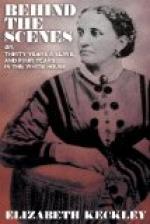I had were in the saddlebag safe. The place where
I stayed in the daytime was in a large shuck-pen—a
pen built in the field to feed stock from, in the
winter time. This pen was on Dr. Dandridge’s
farm; and the second night I worked my way up near
the house. Knowing all the servants, I was watching
a chance to send word to the coachman, Alfred Dandridge,
that I wanted him to tell my wife that I was not gone.
I went down to his cabin, in the quarters; and, after
a short time he came. I was badly scared, and
my heart was heavy and sore; but he spoke comfortingly
to me, and I was cheered, somewhat, especially when
he promised to see Matilda, and tell her of my whereabouts.
He gave me some food, and hid me away for the night
in his house. I kept close all the next day;
and, at night, when all was still, Alfred and I crept
out, and went to old Master Jack’s. The
distance was not great, and we soon covered it.
Alfred went in and told my wife that I was outside
and wanted to see her. She came out, and was
so frightened and nervous that she commenced sobbing
and crying, and almost fainted when I told her, in
low tones, that I was going to try to get to Memphis,
and that Alfred was helping to plan a way to this
end. The rebels occupied both roads leading to
Memphis, and I was puzzled to know how to reach the
city without coming in contact with them. Two
days after I had talked with my wife, the rebel troops
who were camped on the Holly Springs road left for
some other point. My friend Alfred found this
out, and came and told me the encouraging news.
The following night I went to old Master Jack’s
and told my wife that the way now seemed clear, and
that I was going at once. I was bent on freedom,
and would try for it again. I urged my wife not
to grieve, and endeavored to encourage her by saying
that I would return for her, as soon as possible,
should I succeed in getting to a land of freedom.
After many tears and blessings, we parted, and I left,
Uncle Alfred going with me some three miles, as I was
not acquainted with the road. When he left me
I went on alone with gloomy forebodings, but resolved
to do my best in this hazardous undertaking, whatever
might happen. The road passed over hills and
through swamps, and I found the traveling very wearisome.
I had traveled some hours, and thought I was doing
well; when, about one o’clock in the night, I
came up out of a long swamp, and, reaching the top
of a hill, I stopped for a moment’s rest, raising
myself to an erect position from that of walking, inclined
by reason of weariness and the weight of the saddle-bags
thrown across my shoulders. The weather was bad,
a heavy mist had come up, and was so dark that I could
hardly see my way. As I started on, a soldier
yelled at me from the mist: “Halt! advance
and give the countersign.” I stopped immediately,
almost scared out of my wits. “Come right
up here,” said the soldier, “or I’ll
blow you into eternity.” I saw at once he
was a rebel soldier. I knew not what to do.




